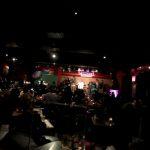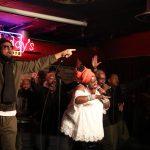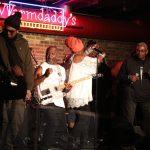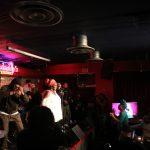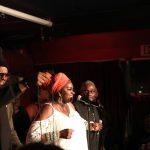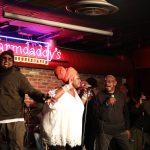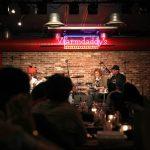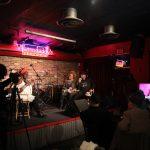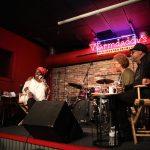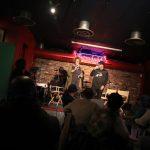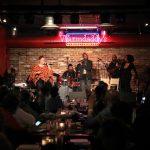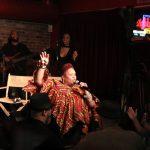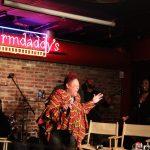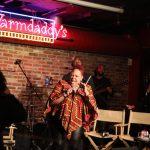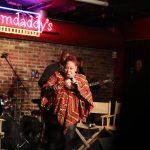Lady Alma and Loose Ends’ Jane Eugene bring the conversation and burn the house down at Kindred Presents

Kindred Presents | photo by John Vettese for WXPN
On a cool and crisp Monday night, a hundred or so people are packed into Warmdaddy’s, for Kindred Presents, a weekly series that is part talk show, part concert / jam session / revival. Most of the attendees were seated in the dining area, some standing by the bar, pretty much all were smiling, taking in the easy, familial vibe that permeated the room. Upon entering the room, I was seated at a large round table in the back with a group of folks I didn’t know. After a round of introductions, we shared a couple plates of Southern-style sweet and buttery cornbread, joked and made small talk, while waiting for the start of the show.
Aja Graydon Dantzler and Fatin Dantzler, better known as Kindred The Family Soul, took to the stage backed by their tight house band, laying down a mellow, soulful groove. For the past 26 weeks or so, Kindred The Family Soul have hosted Kindred Presents a variety show-style live series in which the duo invites a veritable who’s who of contemporary Black music for an evening of soul food, fun, intimate conversation and music.
The show’s format is simple, Aja and Fatin conduct a short, casual chat with the guest, after which the guest proceeds to join the band and burn the house down! The first guest of the night was Philly’s own Lady Alma Horton.
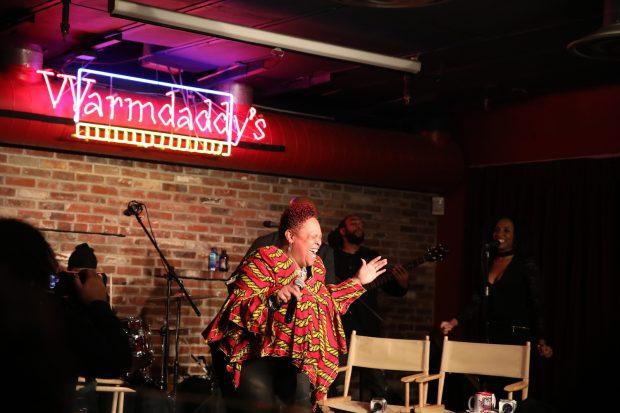
Kindred Presents | photo by John Vettese for WXPN
A criminally underrated singer / songwriter, Horton has brought her powerful voice and soulful style to countless club classics such as and 4Hero’s genre defining tune “Hold It Down”. She spoke candidly about getting her start singing in the church as a child as well as her time working on King Britt’s classic debut album When The Funk Hits The Fan. It was this working relationship with Britt that would help Horton establish herself as a go-to vocalist for Club DJs and Dance music producers around the world. Following her interview, Horton proceeding to blow through a short and dynamic set that included the classic Sylk 130 cut “Happiness”. Projecting her bright, loving and playful energy through the music, Horton’s performance evoked a feeling I haven’t quite felt since I was in my late teens creeping into the Five Spot in Old City for the legendary Black Lily open mic night. This was more fun than ANYBODY ought to be having on a Monday night.
Next, Jane Eugene, lead singer of British Funk / R&B chart-toppers Loose Ends took to the stage for a revealing interview that touched on the band’s history (recording at Philly’s Sigma Sound Studios and writing for Phyllis Hyman) in addition to offering some piercing insights into the music business and the current state of Black music. Eugene hits the nail on the head during her interview when she stated that “Record companies started backing out of R&B after hip hop proved itself. It’s harder now, we had a machine behind us.” In the midst of Loose Ends’ raucous performance I couldn’t help but look around the room wonder, what happens to this music as some of the genre’s most brilliant talents continue to age out of the grind of touring and promoting new music, especially after label support had all but dried up?
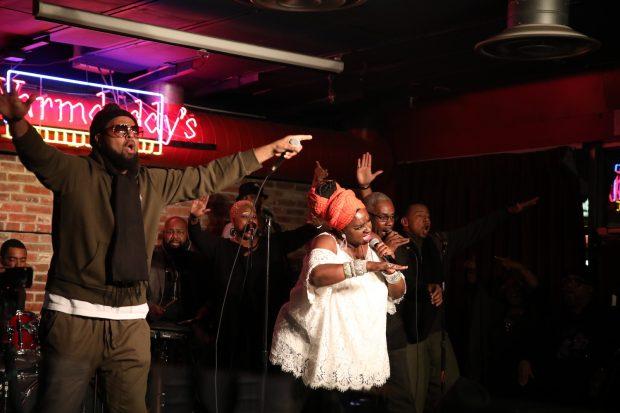
Kindred Presents | photo by John Vettese for WXPN
A common thread that emerged several times throughout the evening was the struggle of working as an independent artist. This grind is especially difficult for R&B musicians here in the states because in the digital age, R&B has been treated sort of like the unloved stepchild of american popular music. R&B is often misunderstood, if not outright dismissed by rock critics. It is not typically viewed with the same prestige as Jazz, nor is it commonly thought of as the pop-cultural vanguard like Hip Hop & Electronic music. Like, most of the record industry, the genre has suffered commercially as well. When Rap emerged as young Black america’s preferred form of musical expression, the record industry began to shift its focus away from R&B. Of course the two genres intermingled, but it seemed like once Hip Hop had asserted its commercial dominance, R&B would have to adapt or find itself left behind.
Philadelphia has always been a home for Soul Music. From the earliest days of Doo-Wop, through the Cameo-Parkway label and the explosive musical revolution staged by Gamble and Huff’s storied Philadelphia International label. This thread continued on, as the city’s rich and fertile R&B scene would come to be identified with blossoming Neo Soul movement of the late 90s, early 2000s. During this time a variety of Philly based R&B acts were signed to major record deals. National and international acts would also flock to the city to work with local producers and songwriters in hopes of absorbing some of that Philly flavor, the same as Elton John and David Bowie had done a generation earlier during Gamble and Huff’s heyday. As trends changed, the music business and some fans would eventually move on but the music remains and “As a people… especially when it comes to Black music We innovate and move on to the next. We’re so intensely involved in creation that we forget to preserve what we’ve created.” Aja says. Kindred Presents aims to serve as a space to preserve that legacy.
*Note: Last week we speculated that Kindred Presents is possibly the best live music event in the city. We were wrong. Kindred Presents is DEFINITELY the best live music event in the city.
- Kindred Presents | photo by John Vettese for WXPN
- Kindred Presents | photo by John Vettese for WXPN
- Kindred Presents | photo by John Vettese for WXPN
- Kindred Presents | photo by John Vettese for WXPN
- Kindred Presents | photo by John Vettese for WXPN
- Kindred Presents | photo by John Vettese for WXPN
- Kindred Presents | photo by John Vettese for WXPN
- Kindred Presents | photo by John Vettese for WXPN
- Kindred Presents | photo by John Vettese for WXPN
- Kindred Presents | photo by John Vettese for WXPN
- Kindred Presents | photo by John Vettese for WXPN
- Kindred Presents | photo by John Vettese for WXPN
- Kindred Presents | photo by John Vettese for WXPN
- Kindred Presents | photo by John Vettese for WXPN
- Lady Alma at Kindred Presents | photo by John Vettese for WXPN
